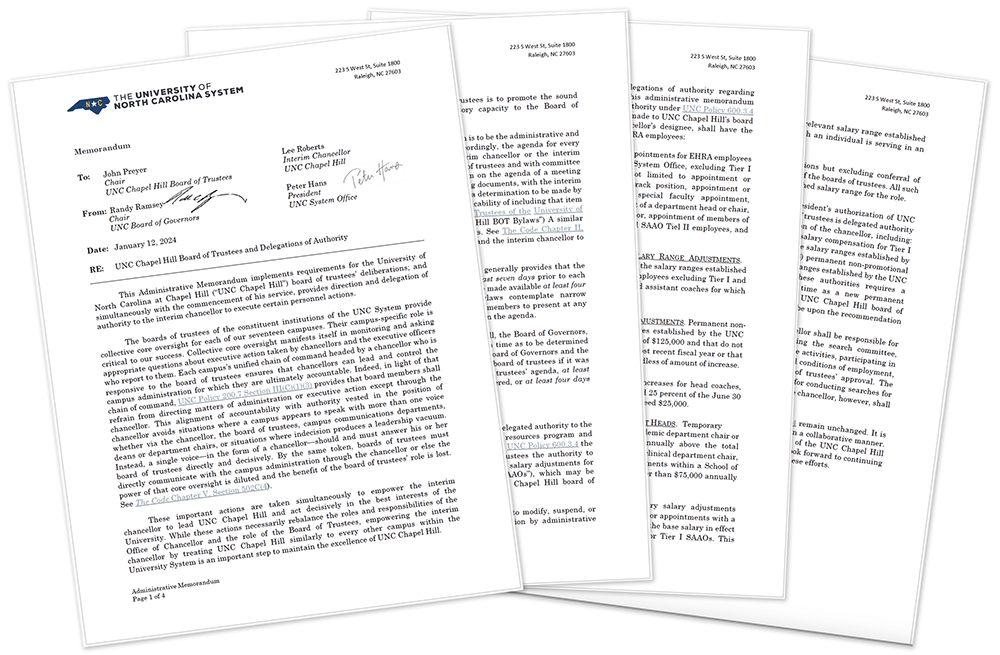RALEIGH (April 10, 2024) – Call it a well-earned smackdown.
On the day Lee Roberts took office as Interim Chancellor at UNC-Chapel Hill in January, UNC System leaders sent the Chair of the university’s Board of Trustees a memo reminding him of the limits on the board’s authority and reassigning certain personnel powers to Roberts.
“In light of that chain of command, (UNC System Policy) provides that board members shall refrain from directing matters of administration or executive action except through the chancellor,” says the Jan. 12 memo from UNC System President Peter Hans and UNC Board of Governors Chair Randy Ramsey to Board of Trustees Chair John Preyer and Roberts.
“This alignment of accountability with authority vested in the chancellor avoids situations where a campus appears to speak with more than one voice.”
It goes on to admonish: “The role of the constituent institution boards of trustees is to promote the sound development of the institution by serving in an advisory capacity to the Board of Governors and the chancellor.”
The memo lays out procedures for preparing agendas for Board of Trustees meetings and giving proper notice of agenda items to the public. And it reassigns eight personnel and salary actions – including coaches’ salaries – from the Board of Trustees to the interim chancellor.
“The Board of Governors and the System Office will only consider action by the UNC Chapel Hill board of trustees if it was noticed, and distributed through the UNC Chapel Hill boards of trustees’ agenda, at least seven days prior (to) the regular meeting where the item was considered, or at least four days prior to the special meeting where the item was considered,” it says.
THE MEMO IS SEEN AS A REBUKE to what many see as an overactive, micromanaging Board of Trustees. Roberts has already made it clear in initial interviews that he works for Hans, the System President.
News & Observer reporter Korie Dean compared the memo to Chapel Hill officials with one sent the same day to leaders at Elizabeth City State University and found them almost identical – but the memo to ECSU leaders did not include language about the board’s advisory role or meeting and agenda-setting procedures.1
In particular, the Chapel Hill memo’s references to agenda-setting and speaking with one voice summon memories of a board meeting in January 2023 where – to the surprise of administrators – then-Chair David Boliek “walked on” a resolution to the meeting agenda calling for the university to accelerate development of a School of Civic Life and Leadership.
Adoption of the resolution was followed by a victory celebration of sorts featuring Boliek and Preyer on Fox & Friends, as well as pre-arranged interviews with board members with the editorial board of The Wall Street Journal.2
A month after the U.S. Supreme Court overturned race-conscious admissions at UNC-Chapel Hill last year, the board also passed a resolution banning consideration of race, sex, color, ethnicity or religion in admissions, hiring or contracting.
Board member Ralph Meekins, a lawyer from Shelby, “implore(d)” the board to consult with its lawyer first.
“I know for a fact that this resolution goes well beyond the Supreme Court decision,” Meekins said at the time, “and if you talk to any lawyer, they’ll tell you the same.”3
MEEKINS CITED the January memo in a committee discussion last month where trustee Jim Blaine, a former chief of staff to state Senate leader Phil Berger, said he expects legislators or the Board of Governors to follow Florida and eliminate diversity, equity and inclusion (DEI) efforts at public universities. He suggested that the university plan for it.
Meekins responded that the Board of Trustees should not get ahead of the Board of Governors.
“We’ve gotten a memo from them recently telling us to stay in our lane,” Meekins said. “And I think this is one area where we need to stay in our lane. Let’s wait and see what they say, and then we can adapt and we can meet whatever the ramifications are from any changes in our DEI.”4
That echoes themes – in fact, some of the same language – in Public Ed Works’ 2020 series, Making Governance Work, which focused on proper behavior for UNC governing boards.
“We ask you to make policy. Not to administer policy, but to make policy,” Belle Wheelan, president of the agency that accredits colleges in 11 Southern states, told the Board of Governors in a 2017 presentation.
“When boards start micromanaging, you’re stepping out of your lane and it gets my attention,” Wheelan said. “And then I have to come back in a different capacity.”5
Tension between the System Office and leaders of the Chapel Hill campus is also evident in the makeup of the advisory search committee Hans named to suggest candidates for a new chancellor at Carolina.
Unlike most, if not all, previous chancellor searches, the committee is headed not by the Chair of the Board of Trustees, but by Dr. Cristy Page, a professor and respected executive dean at the UNC School of Medicine.[6] Members were instructed at the committee’s first meeting last month that only Page should speak for the committee.
This Board of Trustees has more than earned an admonishment to stay in its lane, and Hans and Ramsey should be appreciated for delivering it.
1 https://www.newsobserver.com/news/local/education/article287138430.html.
2 https://www.dailytarheel.com/article/2023/01/university-unc-leaders-blindsided-trustees-decision-professional-school; https://publicedworks.org/2023/11/perfect-example-why-guskiewicz-needs-to-stay/.
3 https://publicedworks.org/2023/08/unc-students-deserve-to-believe-they-belong/.
4 https://www.newsobserver.com/news/local/education/article287138430.html.
5 https://hew.aveltsagency.com/2020/02/wheelan-stay-in-your-lane/.
6 https://publicedworks.org/2024/03/unc-ch-chancellor-search-launches/.


Leave a Reply